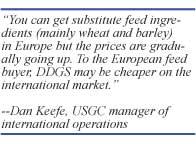Europe’s slowed economy has presented challenges for European feed buyers, but also potential opportunities for U.S. farmers and ethanol producers, particularly for the export of distiller’s dried grains with solubles (DDGS). Capitalizing on this window of opportunity, the U.S. Grains Council recently conducted DDGS marketing workshops in Dublin, Madrid and Rotterdam in an effort to introduce buyers and sellers to one another and to market the United States’ ability to meet the needs of each country.
According to Dan Keefe, USGC manager of international operations, there continues to be strong European interest in the ethanol co-product, particularly due to the region’s current economic situation.
“The concern right now is about price and quality,� he said. “You can get substitute feed ingredients (mainly wheat and barley) in Europe but the prices are gradually going up. To the European feed buyer, DDGS may be cheaper on the international market.�
Already in 2010, two European countries have purchased shipments of DDGS: Ireland and Spain.
“Ireland imported 84,500 metric tons between January and March,� Keefe said. He also noted that Spain’s purchased 9,163 tons this year despite the fact that the United States is not usually price competitive in that country due to Spain’s easy access to wheat from the Mediterranean.
While the declining euro makes U.S. dollar-based DDGS less price-competitive in Europe overall, if U.S. DDGS prices decline further, relative to domestic corn this summer, then the United States could see more purchases from Spain and Ireland in the coming months. According to Keefe, the market potential for the European Union is approximately 1.5 million tons in total, and the United States is competitively priced in at least two countries and break even to substitute feeds in a few more.
Keefe said that while in Europe, the team also met with a delegation from Turkey where the potential demand is 500,000-1 million tons for DDGS and corn gluten feed. Currently, U.S. origin prices are very competitive compared to their local feed ingredient alternatives on a landed price basis. “If the Turkish market fully reopens to imports of biotech corn products, the United States will see a rapid resumption of DDGS and CGF imports to Turkey,� Keefe said.
All this is reason enough for U.S. producers and distillers to be optimistic as developments in the EU region point to new opportunities for DDGS export growth. Jim Hansen of POET Nutrition in Sioux Falls, S.D., was among several USGC members who attended recent workshops in Europe with the Council. According to Hansen, the Council-led meetings were a great success; they were well-attended by feed millers who were very interested in importing DDGS and the meetings produced promising results.
“Upon my return from Europe on Memorial Day weekend, I came back to find three e-mails waiting for me. One from Ireland, one from Spain and one from Turkey, each requesting a quote,� Hansen said. “I think that alone attests to the success of the seminars and the growing interest in DDGS in Europe.�
By Jodi Kiely, USGC Contributing Writer


